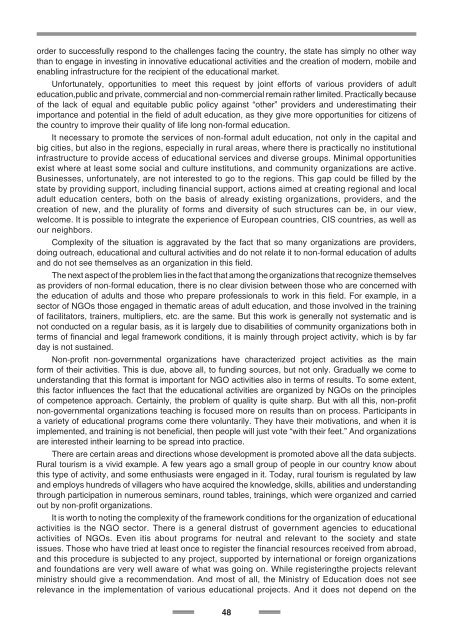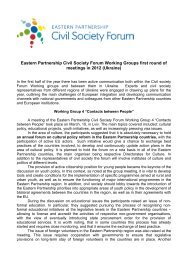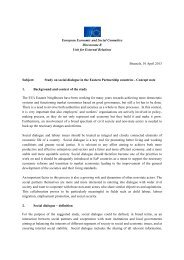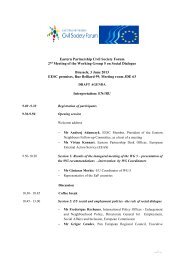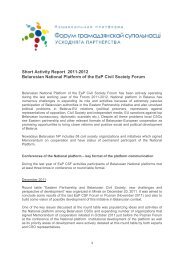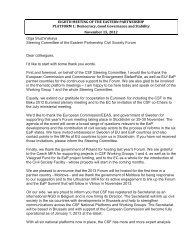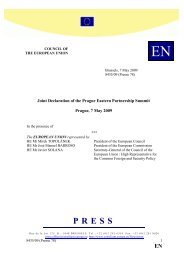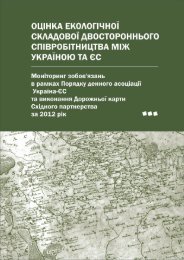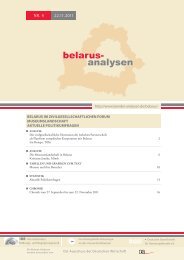Non-formal education - Eastern Partnership Civil Society Forum
Non-formal education - Eastern Partnership Civil Society Forum
Non-formal education - Eastern Partnership Civil Society Forum
Create successful ePaper yourself
Turn your PDF publications into a flip-book with our unique Google optimized e-Paper software.
order to successfully respond to the challenges facing the country, the state has simply no other way<br />
than to engage in investing in innovative <strong>education</strong>al activities and the creation of modern, mobile and<br />
enabling infrastructure for the recipient of the <strong>education</strong>al market.<br />
Unfortunately, opportunities to meet this request by joint efforts of various providers of adult<br />
<strong>education</strong>,public and private, commercial and non-commercial remain rather limited. Practically because<br />
of the lack of equal and equitable public policy against “other” providers and underestimating their<br />
importance and potential in the field of adult <strong>education</strong>, as they give more opportunities for citizens of<br />
the country to improve their quality of life long non-<strong>formal</strong> <strong>education</strong>.<br />
It necessary to promote the services of non-<strong>formal</strong> adult <strong>education</strong>, not only in the capital and<br />
big cities, but also in the regions, especially in rural areas, where there is practically no institutional<br />
infrastructure to provide access of <strong>education</strong>al services and diverse groups. Minimal opportunities<br />
exist where at least some social and culture institutions, and community organizations are active.<br />
Businesses, unfortunately, are not interested to go to the regions. This gap could be filled by the<br />
state by providing support, including financial support, actions aimed at creating regional and local<br />
adult <strong>education</strong> centers, both on the basis of already existing organizations, providers, and the<br />
creation of new, and the plurality of forms and diversity of such structures can be, in our view,<br />
welcome. It is possible to integrate the experience of European countries, CIS countries, as well as<br />
our neighbors.<br />
Complexity of the situation is aggravated by the fact that so many organizations are providers,<br />
doing outreach, <strong>education</strong>al and cultural activities and do not relate it to non-<strong>formal</strong> <strong>education</strong> of adults<br />
and do not see themselves as an organization in this field.<br />
The next aspect of the problem lies in the fact that among the organizations that recognize themselves<br />
as providers of non-<strong>formal</strong> <strong>education</strong>, there is no clear division between those who are concerned with<br />
the <strong>education</strong> of adults and those who prepare professionals to work in this field. For example, in a<br />
sector of NGOs those engaged in thematic areas of adult <strong>education</strong>, and those involved in the training<br />
of facilitators, trainers, multipliers, etc. are the same. But this work is generally not systematic and is<br />
not conducted on a regular basis, as it is largely due to disabilities of community organizations both in<br />
terms of financial and legal framework conditions, it is mainly through project activity, which is by far<br />
day is not sustained.<br />
<strong>Non</strong>-profit non-governmental organizations have characterized project activities as the main<br />
form of their activities. This is due, above all, to funding sources, but not only. Gradually we come to<br />
understanding that this format is important for NGO activities also in terms of results. To some extent,<br />
this factor influences the fact that the <strong>education</strong>al activities are organized by NGOs on the principles<br />
of competence approach. Certainly, the problem of quality is quite sharp. But with all this, non-profit<br />
non-governmental organizations teaching is focused more on results than on process. Participants in<br />
a variety of <strong>education</strong>al programs come there voluntarily. They have their motivations, and when it is<br />
implemented, and training is not beneficial, then people will just vote “with their feet.” And organizations<br />
are interested intheir learning to be spread into practice.<br />
There are certain areas and directions whose development is promoted above all the data subjects.<br />
Rural tourism is a vivid example. A few years ago a small group of people in our country know about<br />
this type of activity, and some enthusiasts were engaged in it. Today, rural tourism is regulated by law<br />
and employs hundreds of villagers who have acquired the knowledge, skills, abilities and understanding<br />
through participation in numerous seminars, round tables, trainings, which were organized and carried<br />
out by non-profit organizations.<br />
It is worth to noting the complexity of the framework conditions for the organization of <strong>education</strong>al<br />
activities is the NGO sector. There is a general distrust of government agencies to <strong>education</strong>al<br />
activities of NGOs. Even itis about programs for neutral and relevant to the society and state<br />
issues. Those who have tried at least once to register the financial resources received from abroad,<br />
and this procedure is subjected to any project, supported by international or foreign organizations<br />
and foundations are very well aware of what was going on. While registeringthe projects relevant<br />
ministry should give a recommendation. And most of all, the Ministry of Education does not see<br />
relevance in the implementation of various <strong>education</strong>al projects. And it does not depend on the<br />
48


